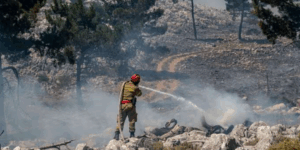Climate, Crisis and Defence – Keeping the Military’s Mission Clear
NATO’s crisis management procedures are clear: military forces may support civilian authorities in exceptional situations, but only as a last resort when other resources are exhausted. This principle is worth recalling at a time when, in the United States, the Pentagon is considering creating a dedicated force for handling civil unrest, while National Guard troops are currently deployed in Washington, D.C. These developments bring back the debate on the limits of military involvement in non-military work.
In Europe, the debate is equally relevant. In recent weeks, several countries have called upon their armed forces to help contain devastating wildfires. Military helicopters, engineering units, and logistical teams have provided essential support to firefighters and local authorities. These actions have saved lives and property, yet they also underline the need for clear rules, training, and coordination so that such interventions remain effective and temporary. The lesson is clear: military help can be crucial in extreme conditions, but long-term solutions must strengthen civilian capacities to cope without relying on constant military assistance.
EUROMIL has consistently underlined that, in exceptional circumstances – such as natural disasters, large-scale emergencies, or other crises – military forces can and should provide support. Their discipline, organisation, and logistical capabilities can be invaluable when every second counts.
 However, this support must remain complementary, not a substitute for civilian services. Soldiers are not garbage collectors, police officers, firefighters (unless foreseen in their function), prison guards, social workers, or migration officers. Assigning the military to routine, specific non-military work risks diverting resources, eroding operational readiness, and blurring the lines between civilian and military responsibilities.
However, this support must remain complementary, not a substitute for civilian services. Soldiers are not garbage collectors, police officers, firefighters (unless foreseen in their function), prison guards, social workers, or migration officers. Assigning the military to routine, specific non-military work risks diverting resources, eroding operational readiness, and blurring the lines between civilian and military responsibilities.
Where deployment is justified, it should be:
- Temporary, limited to the duration of the crisis.
- Targeted, focusing on areas where military expertise or equipment is uniquely valuable.
- Supported, ensuring troops have appropriate training, resources, and legal protections for these tasks.
When the Climate Becomes a Security Threat
 Climate change is increasingly recognised as a security challenge, with NATO acknowledging its potential to intensify conflicts, disrupt societies, and increase demands on crisis management systems. Extreme
Climate change is increasingly recognised as a security challenge, with NATO acknowledging its potential to intensify conflicts, disrupt societies, and increase demands on crisis management systems. Extreme
weather events, rising sea levels, and resource shortages will continue to cause humanitarian crises, migration flows, and instability. In such scenarios, military forces may play a vital, legitimate role – providing rapid response, logistical support, and infrastructure repair when climate-related disasters strike.
Even then, the same rule applies: the armed forces should support, not replace, civilian agencies. Climate change will increasingly become part of the military’s reality – not only as a security challenge that can drive instability and conflict, but also as an operational factor requiring them to act as “climate responders,” providing rapid relief, protection, and logistics when extreme weather or environmental disasters strike.
This does not replace the need for strong civilian capacity. On the contrary, it calls for closer cooperation between the military and sectors such as emergency services, environmental agencies, infrastructure providers, and humanitarian organisations. Police, firefighters, prison staff, social workers, migration officers, medical teams, and other civilian experts must remain central in their domains, with the military offering added value through its unique capabilities. Working together in an integrated way will be essential to face the complex security and humanitarian challenges that climate change will bring.
NATO practice and European experience show that working together makes crisis response stronger. But if governments use the military too often for civilian duties, both sectors will suffer. The best approach is to protect readiness, respect professional roles and keep the armed forces ready for their main mission: the defence of our countries.
Emmanuel Jacob, President of EUROMIL, stated: “We support the military helping when civilian services cannot cope, including in climate-related disasters. But soldiers should not become full-time replacements for firefighters, police, prison guards, social workers or migration officers. The armed forces must stay ready for their main mission: defending our nations.”

